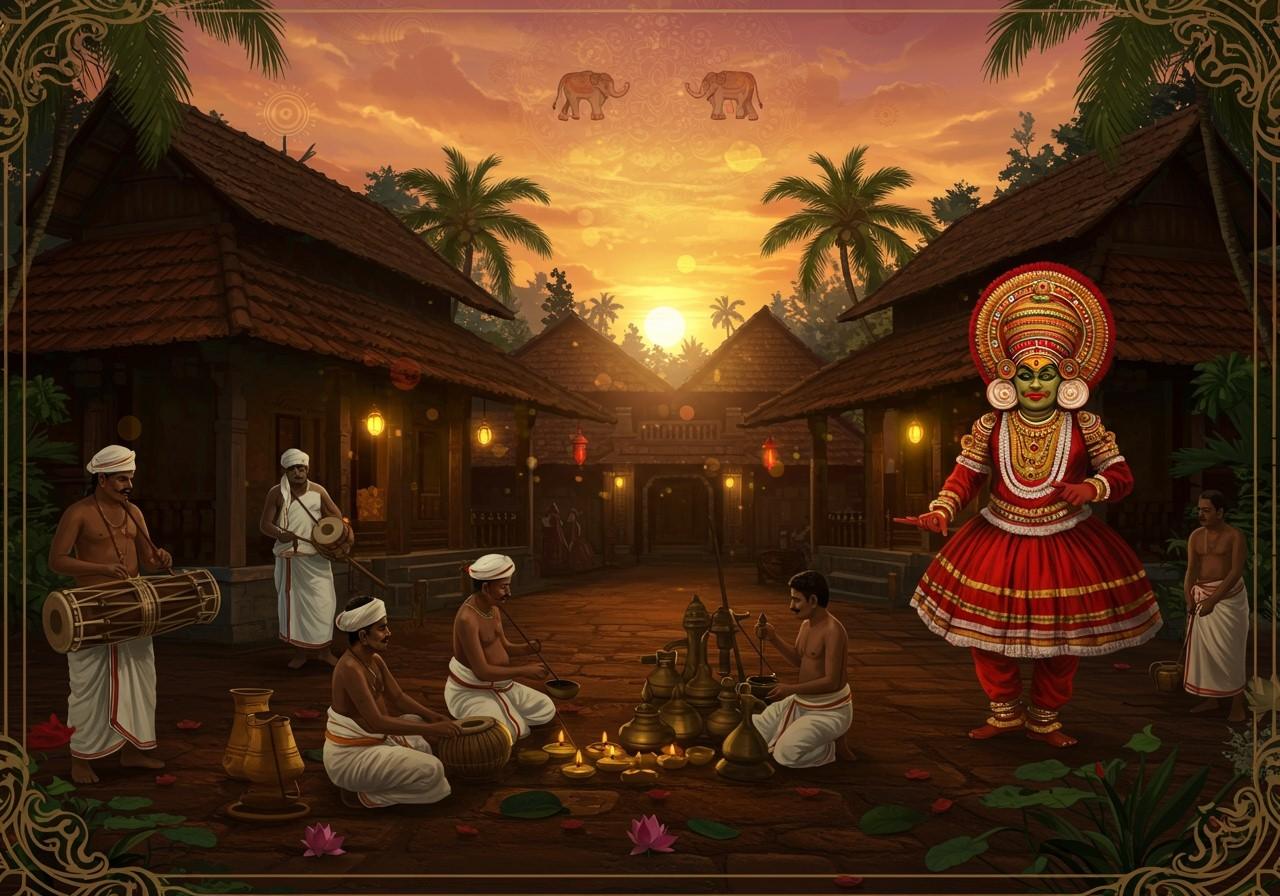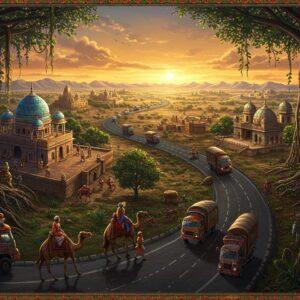
The Ezhava community, a prominent Hindu group in Kerala, boasts a rich tapestry of cultural heritage, woven through generations with vibrant traditions and practices. Let’s delve into the heart of Ezhava culture, exploring its customs, rituals, and artistic expressions.
Key Traditions and Cultural Practices
- Festivals: Onam and Vishu are celebrated with immense enthusiasm, marked by traditional rituals, joyous gatherings, and delicious feasts. Homes are adorned with intricate floral decorations (pookalam) during Onam, while Vishu is celebrated with the auspicious ‘Vishukkani,’ a display of symbolic items that bring prosperity and good fortune.
- Wedding Celebrations: Ezhava weddings are traditionally known for their elegance and simplicity, often celebrated as one-day events filled with meaningful rituals like Nischayam (engagement), Paranjoonu or Virunnu (engagement feast), Mothiram Maatal (ring exchange), Thalikettu (tying the Thali – the sacred pendant), and Malakal Charthal (garland exchange). These ceremonies bind two families and mark a new beginning for the couple.
- Artistic Expressions: From the graceful movements of Mohiniyattam to the dramatic storytelling of Kathakali, Ezhava artistic traditions showcase the community’s deep connection to the arts. These forms often depict tales from mythology and epics, passing cultural narratives down through generations.
Looking for traditional attire or decorations for these celebrations? Explore Poojn.in’s collection of festive items.
- Family Structures and Lineage: Family plays a central role in Ezhava culture. Historically, family structures varied across Kerala, with influences from matrilineal, matrilocal, and patrilineal systems. The concept of Gothram, representing ancestral lineage, fosters a strong sense of belonging, while the Tharavad, the ancestral home, stands as a symbol of heritage and continuity.
- Sub-Castes: The Ezhava community is further diversified by various sub-castes, each with its own unique customs and traditional occupations, reflecting the diverse social fabric within the community.
A Glimpse into History
The Ezhavas trace their roots back to Kerala, with narratives suggesting a lineage connected to coconut farmers from Sri Lanka. Historically, they faced societal challenges and were considered Avarna (out-caste), experiencing discrimination. However, the Ezhava community played a significant role in social reform movements, spearheaded by visionaries like Sree Narayana Guru. His teachings emphasized equality, education, and social justice, empowering the community and laying the foundation for a more inclusive society.
Traditional Occupations
Historically, Ezhavas engaged in a wide range of occupations, demonstrating their versatility and adaptability. Their skills extended from traditional healing practices as Ayurvedic physicians to the martial arts as Kalari trainers and warriors. They also excelled as traders and merchants, and many contributed to agriculture and toddy tapping, showcasing their deep connection to the land and its resources.
How Poojn.in Supports Ezhava Cultural Practices
At Poojn.in, we understand the importance of preserving and celebrating cultural heritage. We offer a wide selection of authentic items essential for Ezhava rituals, ceremonies, and artistic expressions. Whether you’re looking for puja kits, traditional lamps (nilavilakku), musical instruments like the Chenda, or attire for cultural performances, we have everything you need to honor your traditions.
- Ritual Items for Ceremonies: Complete puja kits for traditional Ezhava ceremonies, pure brass and copper items for temple rituals, traditional lamps (nilavilakku) used in cultural performances, and sacred threads and materials for religious ceremonies. Find everything you need to create a sacred and auspicious atmosphere for your rituals. We offer a wide selection to suit every need and preference.
- Musical Instruments: From Chenda drums and accessories to Ilathalam (cymbals) and Kombu (horn instrument), we offer a curated selection of traditional musical instruments, including clay noggins for puja. We also provide maintenance supplies to keep your instruments in pristine condition. Preserve the melodious traditions of Ezhava music with our high-quality instruments.
- Cultural Performance Items: Enhance your cultural performances with our range of traditional costume accessories, bells, percussion instruments, sacred items for Theyyam performances, and ritual decorations for cultural events. Find traditional dhotis and other attire to complete your ensemble. Bring your performances to life with authentic and vibrant accessories.
Experience the convenience of online shopping for your cultural needs:
- Visit www.poojn.in
- Call us at 03369029784
- WhatsApp us at 9476142738
- Enjoy doorstep delivery across India
- Receive expert guidance on product selection
All items at Poojn.in are quality-checked and sourced from authentic manufacturers. We ensure proper packaging of delicate instruments and ritual items for safe delivery.
Celebrating Ezhava Cultural Heritage
Celebrating Ezhava culture is a celebration of life, heritage, and continuity. From the vibrant festivals that bring communities together to the timeless art, music, and dance that express the soul of the community, Ezhava traditions are a treasure trove of cultural richness. As times change, the Ezhava community gracefully adapts, ensuring that these traditions remain vibrant and relevant for generations to come. By cherishing and preserving these cultural treasures, the community strengthens its identity and contributes to the diverse cultural tapestry of Kerala, inspiring future generations with the beauty of heritage and tradition.
Common Questions about Ezhava Culture
People often ask about the unique aspects of Ezhava culture. Here are a few common queries:
What distinguishes Ezhava art? Ezhava art is renowned for its intricate details, vibrant colors, and the reflection of the community’s heritage and traditions. Themes often revolve around nature, mythology, and scenes from everyday life.
Which instruments are traditionally used in Ezhava music? Traditional Ezhava music frequently incorporates instruments like the chenda (a type of drum), the harmonium, and the flute. These instruments create the rhythmic and melodious tunes central to Ezhava folk songs.
What are some well-known Ezhava folk dances? Kummattikali and Thiruvathirakali are among the popular Ezhava folk dances, often performed during festivals and celebrations. They feature vibrant costumes and energetic music, adding to the festive spirit.
How do Ezhava cultural expressions connect with their traditions? Ezhava expressions, encompassing art, music, and dance, deeply reflect their traditions. They incorporate elements of history, beliefs, and ways of life, passed down through generations, safeguarding their cultural identity.
What themes typically appear in Ezhava paintings? Ezhava paintings frequently portray nature, showcasing flowers, animals, and scenes from both daily life and mythology. These themes highlight the community’s connection to their environment and their spiritual beliefs.
What sets Ezhava music apart from other regional music? Ezhava music has a distinctive character, marked by the use of specific instruments and rhythmic patterns. It often accompanies traditional dances and rituals, distinguishing it from other regional music forms that might lean towards classical or contemporary styles.
What is the significance of dance in Ezhava culture? Dance holds a special place in Ezhava culture as a powerful form of storytelling and expression. It unites the community during festivals and celebrations, reinforcing social bonds and cultural heritage.
Are there specific festivals showcasing Ezhava art and music? Yes, festivals like Onam and Vishu often feature Ezhava art and music prominently. These events provide a platform for the community to display their traditional art forms and celebrate their cultural identity.
For further exploration of temple traditions and rituals, visit our blogs on Saptashrungi Temple and Ashtabhuji Temple.


